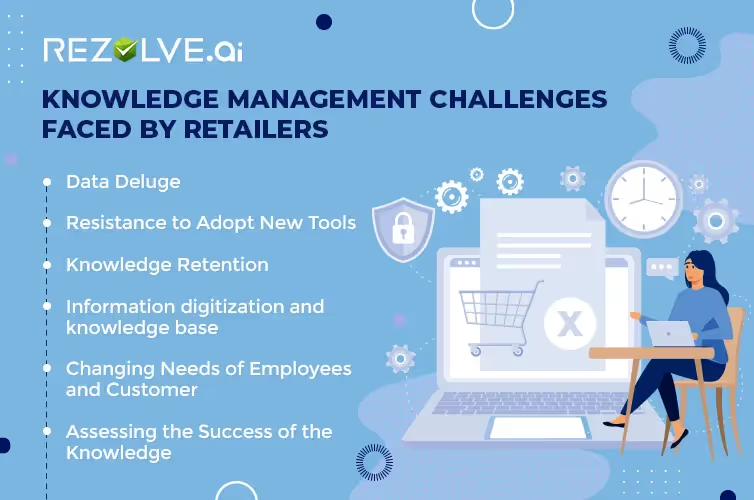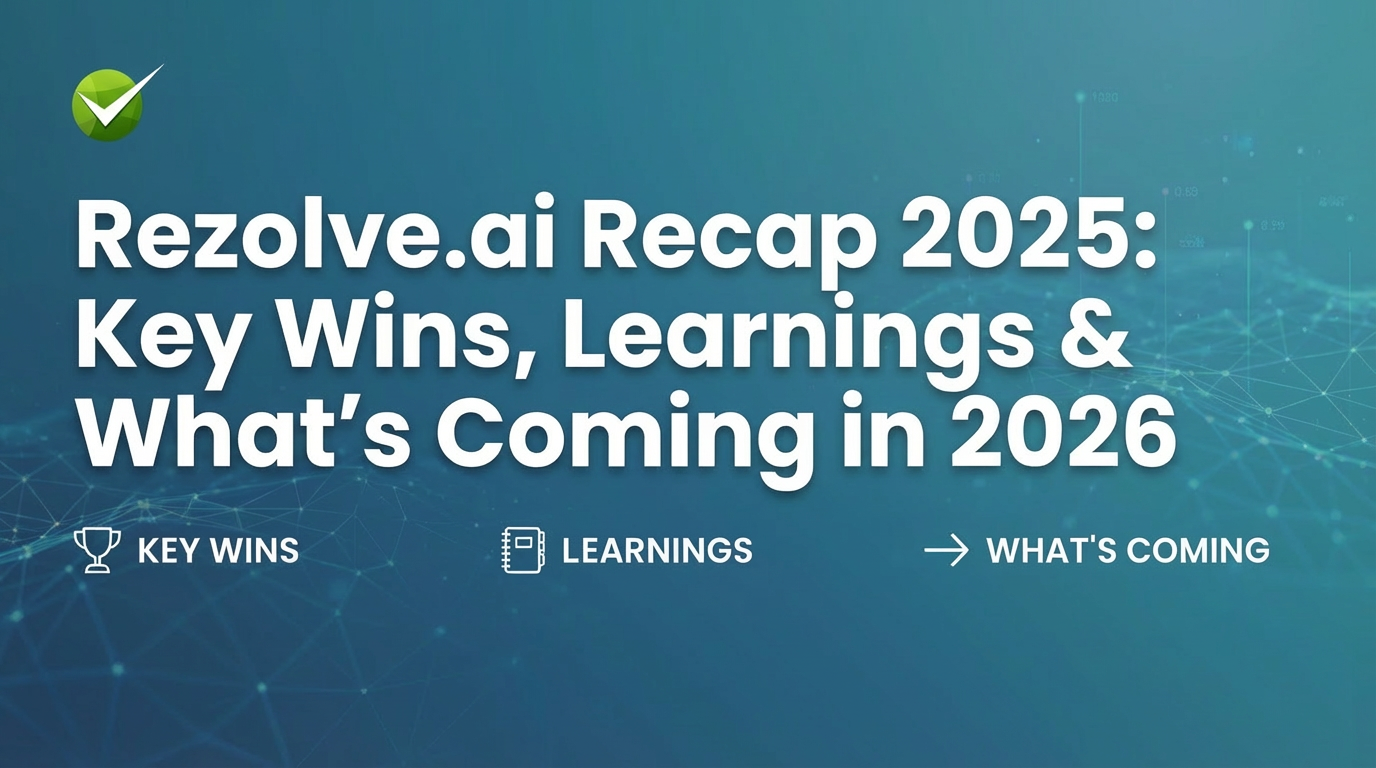The retail industry is undergoing a profound digital transformation unlike any other in this rapidly changing economic climate. Incorporating advanced technologies like Generative AI and Machine Learning has become essential for maintaining competitiveness as brick-and-mortar stores adjust to the retail trends and customer expectations change. In knowledge management, artificial intelligence (AI) is one such technology that has gained prominence. AI knowledge management is like magic wands that can provide flawless employee support, seamless customer service, smooth operations, and unlimited growth.
Now, you may be wondering why this digital magician is so essential. Let me tell you this with the facts: A Statista report states that the retail industry is anticipated to reach a staggering 27.73 trillion dollars, marking its most significant contribution yet. This amount is predicted to reach 32.8 trillion dollars by the end of 2026. That’s jaw-breaking numbers, right? Indeed, these figures show that the retail sector has a promising future. Furthermore, it is not easy to succeed in this fiercely competitive market in this rapidly growing industry.
It is up to you to determine what will enable you to make your organization "the best" for your customers. Undoubtedly, you'll be able to outperform your competitors if you keep an eye on employee experience and engagement and create unmatched customer experiences. And investing in AI knowledge management for the retail sector is the quickest way to accomplish this.
In this blog post, we will explore AI knowledge management's capability to reshape how retailers conduct business and interact with their customers. Before we begin, let's look at the retail industry's challenges.
Pain Points Faced by Retailers Today
Needless to say, the retail sector is constantly buzzing with activity as it caters to shifting employee needs, consumer preferences and emerging trends. However, beneath the glitz and glamour, retailers must navigate a maze of difficulties every day.
Data Deluge: Finding Your Way Through the Information Sea
The data generated from various sources, including sales, customer interactions, market trends, and more, is a sea in which the retail industry must navigate in this ever-evolving economic culture. However, turning this enormous sea of data into useful insights is challenging. As reported by IBM, more than 2.5 quintillion bytes of data are produced daily; thus, implementing an AI knowledge management system for the retail sector is advisable to sort through this data deluge and extract insightful knowledge.
Resistance to Adopt New Tools
Employee resistance to new technology will likely exist for a variety of reasons.
- Employees won't use the information if it isn't updated frequently or if it isn't accurate, given how the product is currently performing. After all, they will be questioned if they provide inaccurate information about the product, which causes them to lose clients or ultimately frustrate them.
- They may hesitate to use the knowledge base if it is difficult to use or navigate. Remember that your employees and customers expect prompt service from your support agents or technicians. If the support team cannot come up with the most relevant solution, they risk losing clients during the call or even during a live chat exchange. All because they had trouble navigating it.
Employees are hesitant to adopt new technologies like modern retail service desks due to these problems. They'll either find it challenging to use or a distraction from their work.
Knowledge Retention and the Ephemeral Employee
The retail industry has a high employee turnover rate, which frequently results in a never-ending cycle of hiring new employees. As reported by McKinsey, frontline retail employees typically experienced an annual employee turnover rate of at least 60%. Knowledge about organizations, their products, customer preferences, and operational procedures can be lost as experienced employees depart. This turnover affects the quality of employee productivity, customer interactions, operational efficiency and overall business ROI.
Thus, adopting effective retail knowledge management strategies enables the onboarding of new employees and facilitates the transfer of institutional knowledge.

Information Digitization
Implementing AI knowledge management for the retail industry digitizes all the data from scratch could be another difficulty you run into. A repository is challenging to construct. Because of this, you must create content for each feature and its associated functionality in the product.
Retailers must also increase the pertinent data based on the behavior and purchasing trends the sales, support, and success teams can use to their advantage. Integrating this knowledge into a retail knowledge management solution will take some time. Additionally, it must pass several tests to ensure the information is all necessary.
Changing Needs of Employees and Customers
Regardless of the industry, employees now demand personalized support, experience and self-service options, reflecting a significant shift in customer service and satisfaction. It can be difficult to meet these demands while still being human. Retailers can provide personalized support, recommendations and self-service options that meet changing customer demands by effectively managing their knowledge to capture customer insights and preferences.
Assessing and Tracking the Success of the Knowledge
How do you assess whether the knowledge base articles are beneficial to your employees? Do they regularly use it to respond to customers' questions on a daily basis? Furthermore, how will you know whether or not knowledge management was helpful to the users? It can be challenging to evaluate the effectiveness of a knowledge management system and the individual articles within it. However, if you implement the best AI knowledge management for your retail business, you can overcome it.
All the above-mentioned pain points can undoubtedly make knowledge management challenging for your retail business. But if you implement the modern retail service desk solution that offers your company a robust AI knowledge management system, you can quickly get past them.
The Emergence of AI Knowledge Management for the Retail Industry
It's no secret that the retail sector is full of unexpected challenges and turns, just like any complicated maze. However, with the strength of knowledge management, retailers can get past these obstacles and succeed. But for a long time, retail organizations relied on traditional service desks and legacy knowledge management systems that often provided fragmented support.
The traditional knowledge management system in the retail industry has undergone a paradigm shift ever since the emergence of technologies like AI and machine learning. Today, AI is revolutionizing how retailers operate at every level, from inventory management and customer service to personalized shopping experiences and supply chain optimization.
Retailers can turn their problems into opportunities for growth by utilizing AI-driven insights, providing personalized support and experiences, and efficient operations.
In my opinion, implementing AI knowledge management for retail becomes the compass that leads retailers towards success, one tactical choice at a time, in a world where the customer is king.
What Makes AI Knowledge Management Systems Important for Retailers?
We all know that time is money in the hectic world of retail. Without a reliable retail knowledge management system, your employees may waste a great deal of time looking up information, switching back and forth between departments, and occasionally even providing customers with inaccurate or inconsistent information. According to SuperOffice, around 62% of customers expect knowledgeable and helpful customer support agents or technicians, and if they don't get it, they're likely to shop around. What a waste of revenue!
This is where AI knowledge management for the retail sector enters the scene like a superhuman. Imagine having an OpenAI retail service desk like Rezolve.ai with a ChatGPT-like ITSM chatbot that could instantly retrieve information about a product, its inventory, its price, and even make recommendations based on the customer's preferences by leveraging a smart AI knowledge management system. That would be so cool, right? This means investing in AI knowledge management for retail businesses is a no-brainer as retail support agents when customers encounter challenges.
Below I have added how modern AI retail service desks like Rezolve.ai can streamline the support process and elevate the customer experience and satisfaction.
Instant Access to the Right Information
Imagine this scenario: A customer contacts your support team or technicians to find a user manual for a recently purchased product.
Solution: Support agents can utilize the Rezolve.ai service desk in this situation. Being an OpenAI service desk solution that works right within MS Teams, Rezolve.ai leverages the power of Generative AI, machine learning (ML) and natural language processing (NLP) to understand the customer's query. It uses the agile knowledge base to find the right documents, such as user manuals or FAQs related to the product.
Result: The support agent or technician can now provide the customer with a direct link to the user manual, resolving the issue in less than 10-15 seconds.
Contextual Recommendations and Responses
Imagine this scenario: A customer experiences trouble accessing his or her order history on the retailer's website.
Solution: Rezolve.ai is an AI knowledge management for the retail sector that recognizes the customers' queries and offers contextual tips based on the customer's previous interactions and interests. Rezolve.ai's agile knowledge management suggests possible solutions or guides that might help the customer find their order history.
Result: This will help retail IT support agents or technicians select the most suitable suggestion and deliver step-by-step guidance, expediting the process and elevating customer satisfaction and engagement.

An End to the Frustration of the Unknown
Imagine the scenario: Suppose your customers entered your retail store but only discovered a clueless employee untrained to respond to their inquiries. It's like going on a treasure hunt without a map! But this bad experience may confuse and irritate your customers, resulting in customer churn.
Solution: With an AI-Powered retail service desk offering agile knowledge management, you can change the entire scenario. Now, picture this: your employees are armed with answers like seasoned wizards. This is the magic of an AI knowledge management system. Your employees can instantly access this knowledge database, enabling them to assist customers accurately and confidently.
Result: According to a Forrester report, 74% of customers believe that being respected for their time is the most crucial quality of good service. Implementation of AI knowledge management for retail shines in this situation. It values your customers' time by providing the information they require quickly. As soon as customers get the answers they need, their raised eyebrows change into delighted smiles- leading to customer satisfaction and experience.
Real-time Collaboration and Troubleshooting
Imagine this scenario: One of your loyal customers’ contacts support teams or technicians with concerns about an error message they experienced during checkout.
Solution: Implementing an AI knowledge management system in the retail industry analyzes the error description and cross-references it with the troubleshooting database. It determines similar issues previously resolved and delivers guidance on possible solutions.
Result: When your customer support team follows the AI's suggestions and offers personalized support to the customer, managing the issue promptly and preventing cart abandonment.
Feedback Loop and Continuous Improvement
Imagine this scenario: One day, multiple customers encounter challenges accessing a particular category of documents on the retailer's platform. They contacted your retail IT support team for assistance which overwhelmed them.
Solution: When you implement an AI knowledge management for your retail businesses, it helps your support agent to find this pattern of issues and flag it for future reference. It provides the support team with new information and suggests organizing the knowledge base or documents.
Result: The customer support teams may enhance the knowledge management system for future cases in addition to resolving the customer's immediate problems.
These above-mentioned scenarios prove that an AI knowledge management system or AI retail service desk like Rezolve.ai is a helpful ally to retail support agents. By swiftly delivering the right information at the right time, auto-resolving issues, and encouraging seamless collaboration, AI knowledge management empowers agents to provide efficient and effective customer support. This addresses urgent issues and enhances the overall customer experience.
Conclusion
If you are into a retail business, festival season is wonderful, but you can't afford to rely on a knowledge management process that produces poor solutions. Providing exceptional customer service is essential to staying competitive in this ever-evolving customer-focused retail world. Adopting an AI knowledge management system for your retail business gives your team a potent tool to turn obstacles into chances.
A knowledge management system makes it simpler for your employees to find the answers they need when needed, rather than telling them to brace themselves for a challenging few months. As a result, it helps organizations retain their best-performing employees and loyal customers. Although it offers its users many beneficial advantages, implementation difficulties also exist. But if you implement a robust retail service desk like Rezolve.ai with AI knowledge management for your retail company, those can be avoided.
Discover How Rezolve.ai Retail Service Desk Can Elevate Your Knowledge Management to Unprecedented Heights! Book a Demo Now
FAQs
- Why is new-age knowledge management critical for retail companies?
The new-age knowledge management leverages the power of Generative AI, machine learning (ML) and Natural language Processing (NLP) to elevate end-user experiences by providing personalized suggestions and instant issue resolution. - How does AI knowledge management improve customer engagement?
By analyzing customer data, AI systems offer tailored product suggestions and relevant information, leading to higher customer satisfaction and loyalty.
- Can AI-powered knowledge management help with employee training?
Indeed. Implementing an AI knowledge management system for retail helps to consolidate all training materials and best practices, helping in onboarding new employees and providing consistent and efficient training across the workforce. - What are the advantages of adopting AI knowledge management in retail?
Investing in a robust knowledge management system helps retail sectors enhance customer satisfaction, boost employee productivity, and automate time-consuming processes to deliver personalized experiences. - What part does an AI-enabled knowledge base play in using data to make decisions?
Huge amounts of data are analyzed by AI knowledge management, which identifies the retail trends and patterns that help decision-makers make well-informed choices about everything from inventory management to marketing tactics.


%203.png)




.webp)




.jpg)

.png)








.png)